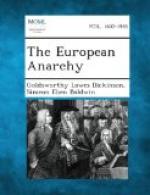The French Ambassador, who must have special reasons for speaking thus, has repeated to me several times that the greatest danger for the maintenance of the peace of Europe consists in the indiscipline and the personal policy of the Russian agents. They are almost all ardent Panslavists, and it is to them that must be imputed the responsibility for the events that are occurring. Beyond a doubt they will make themselves the secret instigators for an intervention of their country in the Balkan conflict.
On November 30, 1912, Baron de Beyens writes from Berlin:—
At the end of last week a report was spread
in the chancelleries of
Europe that M. Sazonov had abandoned the
struggle against the Court
party which wishes to drag Russia into
war.
On June 9, 1914, Baron Guillaume writes from Paris:—
Is it true that the Cabinet of St. Petersburg has imposed upon this country [France] the adoption of the law of three years, and would now bring to bear the whole weight of its influence to ensure its maintenance? I have not been able to obtain light upon this delicate point, but it would be all the more serious, inasmuch as the men who direct the Empire of the Tsars cannot be unaware that the effort thus demanded of the French nation is excessive, and cannot be long sustained. Is, then, the attitude of the Cabinet of St. Petersburg based upon the conviction that events are so imminent that it will be possible to use the tool it intends to put into the hands of its ally?
What a sinister vista is opened up by this passage! I have no wish to insinuate that the suspicion here expressed was justified. It is the suspicion itself that is the point. Dimly we see, as through a mist, the figures of the architects of war. We see that the forces they wield are ambition and pride, jealousy and fear; that these are all-pervasive; that they affect all Governments and all nations, and are fostered by conditions for which all alike are responsible.
It will be understood, of course, that in bringing out the fact that there was national chauvinism in Russia and that this found its excuse in the unstable equilibrium of Europe, I am making no attack on Russian policy. I do not pretend to know whether these elements of opinion actually influenced the policy of the Government. But they certainly influenced German fears, and without a knowledge of them it is impossible to understand German policy. The reader must bear in mind this source of friction along with the others when we come to consider that policy in detail.
6. Austria-Hungary.




